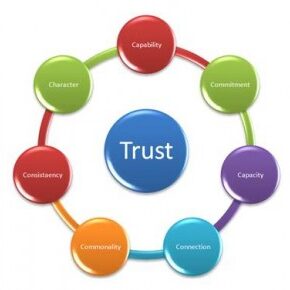
Exploring the Seven C’s of Trust
Trust in teams is an integral part of any successful relationship, be it personal or professional. It’s the foundation upon which partnerships are built and projects are executed. The Seven C’s of Trust provide a framework for understanding and assessing trust in a team or organization. As I was walking my dog around Grays Bay on Lake Minnetonka, dodging the morning traffic, I contemplated how we often place our trust in strangers more readily than in those we work with daily. Let’s explore these Seven C’s and understand how they can help you build stronger, more trusting relationships within your team.
Capability
Trust begins with belief in an individual’s abilities. When a team member has the skills and knowledge to perform their role effectively, it builds confidence in their capability. It’s about recognizing that each person brings their own expertise to the table. To foster capability, encourage ongoing learning and acknowledge the competencies that each member contributes.
Commitment
Next is commitment, which focuses on dedication to achieving what’s most important for the team. Commitment is seen in the person who stays late to finish a report or spends the weekend preparing for an important presentation. It’s about showing up, not just physically, but also with one’s full attention and energy directed towards the team’s goals.
Capacity
Having the time to fulfill one’s responsibilities is crucial. Capacity isn’t just about hours in the day; it’s also about mental and emotional bandwidth. Does your team have the space to think creatively and strategically, or are they bogged down with too many tasks? Ensuring that team members are not overloaded is key to maintaining their capacity to contribute effectively.
Connection
Resources are a part of this puzzle. Connection refers to having the necessary tools, information, and support to complete tasks. It’s about ensuring that there are strong communication channels and that everyone feels they are part of the team. Connection fosters a sense of belonging and support that is critical for trust.
Commonality
Shared interests and values bring people together. When team members have common ground, they’re more likely to trust one another. It could be a shared goal, similar work ethics, or even a mutual hobby. Finding and emphasizing these commonalities can strengthen team bonds.
Consistency
Trust is reinforced by predictability. When people act in a reliable and dependable manner, it creates a safe and stable environment. Consistency in success, behavior, and communication are all vital. This doesn’t mean there isn’t room for flexibility, but that there is a stable core of expectations that everyone meets.
Character
Lastly, integrity is non-negotiable. Character involves honesty, ethical behavior, and making decisions that are not only good for the individual but for the team and organization as a whole. It’s about being whole and complete in one’s work and interactions.
If you find yourself struggling with trust within your team, reflect on these Seven C’s. Where are the gaps? Is there a lack of skill, commitment, or resources? Are team members overburdened, feeling disconnected, or are there inconsistent behaviors that are eroding trust? Assess each of these areas to understand where trust is strong and where it needs to be developed.
Building trust is a journey, not a destination. It requires continuous effort and attention. By focusing on the Seven C’s, you can begin to cultivate a more trusting and cohesive team. Remember, trust starts with you – model these behaviors and watch how they can transform the dynamics within your group. With trust as your guide, your team can navigate any challenge and reach new heights of success.
